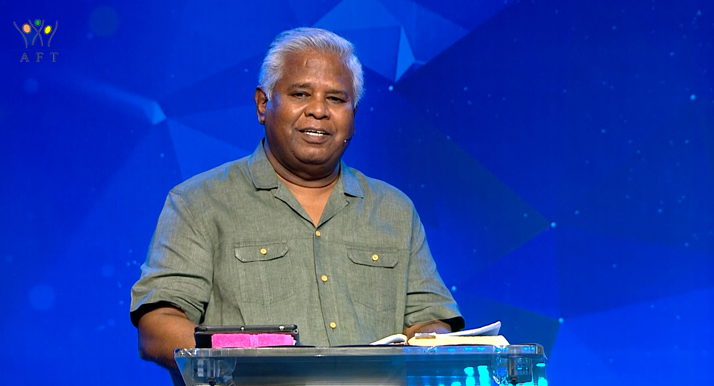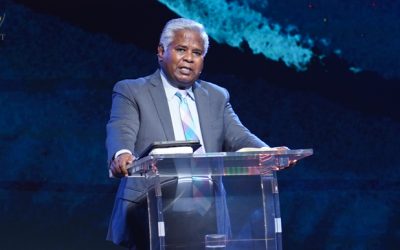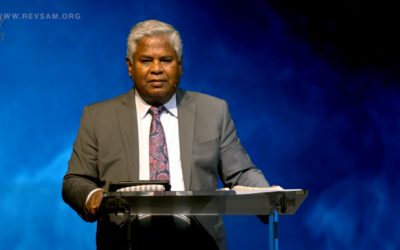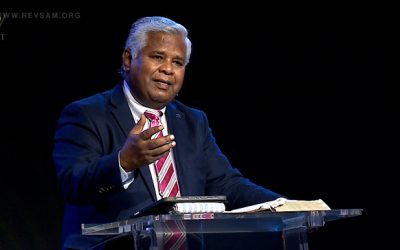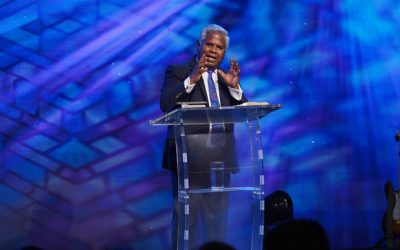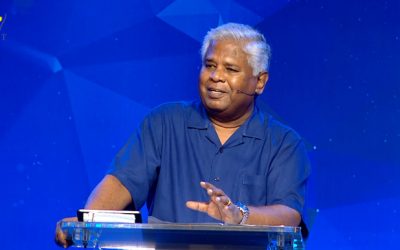
Abounding Grace (Vol. 46) – How Grace Changes Us? (Part-3)
Sunday English Service – 28 NOV 21
Transcript
Please turn with me to Galatians chapter five. We’ve been dealing with this passage for the last two weeks. I want to deal with it one more time. Talking about abounding grace and the term abounding grace comes from Romans chapter five, verse 20, where Paul says, where sin abounded, grace did much more abound. In other words, it means that sin, when it comes into people’s lives, it abounds in the sense that it kind of takes over and tears up and destroys everything about that person. It touches every area of that person’s life and ruins everything. But when a person puts his faith in Jesus, the grace of God comes in. The grace of God comes in and it bounds even much more, it says. Abounding even much more means that it’s more powerful, much more powerful than the work of sin. It not only reverses every damage that sin has costed and sets right everything. It also takes us back to a new level, another level, not just taking us back to where the first time was in the garden of Eden. That’s the original level. That’s the original blessed life that God gave him in the first two chapters of Genesis, we read about it. Last week, I shared with you that in redemption, we are taken back to another level, even a greater higher level because we’re not taken just back to the old Adams kind of life, the first Adams kind of life. But we are taken to another level because we are taken to be like, Jesus, who’s the second Adam.
So we’ve been talking about this, basically about how grace changes us. I’ve been talking about last two weeks from this passage, and this passage is probably the best passage in all of Bible to talk about how the grace of God comes in and changes it and forms and shapes us, maybe Ephesians four and five also is a chapter like that. But this is a tremendous chapter. That’s why I want to spend some time on it. I want to read to you verse 16 to 18 and leave out the portion verse 19, 20 and 21, where it talks about the works of the flesh, and then continue reading from verse 22 to 25. Let me start with verse 16, Galatians chapter five, verse 16, I say, then walk in the spirit and you shall not fill the lusts of the flesh, for the flesh lusts against the spirit and the spirit against the flesh. And these are contrary to one another so that you do not do the things that you wish, but if you’re led by the spirit, you are not under the law. Verse 22, but the fruit of the spirit is love. Joy, peace, long suffering, kindness, goodness, faithfulness, gentleness, self-control. Against such, there is no law. And those who Christ of crucified the flesh with its passions and desires. If we live in the spirit, let us also walk in the spirit. Now we already looked at this passage and saw the nature of the change that happens in the believer, the pattern of the change and the process of the change and all of that. Today, we want to understand more of the nature, the pattern and the process of that change. Now, if you want to understand it, then you need to look at this passage and note four things about this passage is that passage is trying to con convey by using the term fruit of the spirit. Talking about the change that happens in a believer. Paul says fruit of the spirit is produced in the believer since he uses the word fruit, he deliberately uses that metaphor to convey something that means the change is gradual.
First of all, I want to share with you four things. The change is gradual. The change is inevitable. That means it’ll surely happen. There is no way that a change may not happen. It will surely happen because it is the fruit of the spirit. He works it and he will definitely work it. And thirdly, this change is internal. It is something that happens inside of us and as it results, some of changes may happen, but it’s essentially a work of the holy spirit inside of us. And then finally it is symmetrical. Symmetrical is a wonderful word that describes the well-balanced state of things. It’s well balanced, everything in right proportion, everything being there in equal amount in right proportion. All right. So it’s gradual, inevitable, internal and symmetrical. Let me go through these things, one by one. It’s gradual. That’s why he uses the word fruit deliberately using that metaphor that describes how plants grow, how fruits come about and so on. He could have used other words instead of fruit of the spirit. He could have said traits of the spirit or characteristics of the spirit. There are so many ways to say it, but he does not go that way. He uses this particular word fruit of the spirit because he wants to convey to us that just like a seed is planted and out of the seed comes a plant, becomes a tree. And out of that comes a fruit just like that. The change in a Christian’s life comes gradually. Now this is everywhere in the Bible. In the first period of chapter one, the Bible says that we are born again, not of the corruptible seed, but by the incorruptible seed of God’s word. Just like a seed goes into the ground and produces and brings about a tree and fruit in it. That’s how we are born again. He says describes it as a seed going inside.
In Psalm one, we read blessed is the man who meditates on the lord day and night, his delight is in the Lord. He’s like a tree planted by the rivers of waters. His leaf shall not wither, and he eels his fruit in season, eels his fruit in season. So there you have so many scriptures like this that describe the Christian as a person in whom the changes happen in this way. Now, because we say that changes gradual. We can say this, that it means that it’s slow and progressive, and therefore we need to have a lot of patience. It doesn’t happen overnight. It is not always dramatic, but it does happen. It gradually happens, slowly happens and it surely happens. We need to exercise patience when you’ve given your life to Jesus and opened your heart to him, invited him as your Lord and savior, it’s not always true that something dramatic happens to see on the outside, but there is something remarkable that takes place inside the believer. The spirit of God comes into him and begins to produce things that is never there before. And it takes time. That’s why it’s described as a fruit. It just like a fruit comes about. It takes time. It starts in the seed form and then it grows, and then it produces. So it’s slow and progressive. So we need to have patience. We need to understand this many times Christians, they look at themselves say, well, I receive Jesus. Where is the change? What is happening? Well, it is happening on the inside. It is started and it is progressive. It happens step by step, just like a tree grows and produces fruit. Just have to wait it out. You just have to be patience, and you will see the result. When you don’t see something dramatic outside. It doesn’t mean nothing is happening there. Everything that must be done in order to produce a wonderful fruit is happening inside. There is a work going on.
Secondly, it is seasonal, just like trees produce seasonally. The fruit of the spirit is like that because when the fruit of the spirit is produced, sometimes it looks like there is nothing happening there. A mango tree. When the season comes, it brings forth mangoes in plenty in number a, hundreds of mangoes, it yields. But there are months during the year when it looks like it’s doing nothing, it’s just sitting there, not one mango on it. It doesn’t mean nothing is happening there. Everything that should happen in it to produce in the next season, when it comes to produce those mangoes is still working in there. There is life in the tree. There is some activity going on.
Something is going on in the tree to produce when the next season comes. The change in a Christian believer is like that. Sometimes it looks like nothing seems to happen, but there is change happening on the inside. Thirdly, it’s mysterious in the sense that you don’t really feel it or see it, but you can only know that there is growth by measuring or testing it. Growth is like that. Change is like that. When you see little kids growing up. Sometimes if you haven’t seen them for a while, you can tell that they’ve grown up a little bit, but you don’t know. So you say, I think you’ve grown, right? Because we are not sure. We can’t tell exactly that he’s grown, but it looks like he’s grown a little. We don’t know when it happened. We didn’t see him shoot up or anything like that. We didn’t see anything outwardly happen in a drastic way, but somehow something has happened mysteriously inside of him. There is an activity going on and it looks like he has grown up. Fourthly, it’s in visible. You can’t see it. You may be growing, but you never really tell that you are growing and that you have indeed grown until a test or a trouble comes your way, or you face a crisis or a difficult situation, then you’ll find out. Why? If this has happened two, three years ago, I would have been responding differently. I would have feared this situation. I would have worried so much about this situation. This would’ve really disturbed me. This would’ve really caused me to lose sleep. But now, since I believed in Jesus, since I have been carrying on this fellowship with the Lord and relationship with God, some difference is there. There is the fear has greatly reduced. The worry is greatly gone. The anxieties are not there like it used to be.
There is a different in life right now. You can see it. So it’s been gradual and it has been seasonal. It has been mysterious and it’s invisible, but the change does happen. So that is one thing. But the change is also inevitable in the sense that it cannot fail, it’ll happen. That is why it’s called the fruit of the spirit. It is something that the spirit of God does because the spirit of God does it. It is inevitable. The spirit of God will never fail. He will surely and certainly produce the change. If the spirit of God is in you, that’s why you worry less. That’s why you fear less. That’s why the anxiety is reduced. That’s why the changes has happened. That’s why you become a wiser person. That’s why you are able to face your problems like never before. Your troubles don’t seem that big anymore, because some change has happen inside of you. There was a great preacher named G Campbell Morgan in London, preaching at Westminster chapel back in the thirties and forties. And he made a trip to Italy and he talks about it and says that he visited, happened to visit a graveyard. And there are people buried there hundreds of years ago. And as he was looking over the graves, there was one grave which had a great big stone laid over it. They built a wonderful monument, and to write the name and whatever on it. But the thing is as come open, what has happened is an acorn of an Oak tree had fallen there. The seed from the Oak tree has fallen there inside where the body is buried and it has taken root and it has sprouted up and become a tree, and it has pushed that stone and literally broke that stone and has grown to be a very big and tall tree coming out of that grave. He says that was an amazing site to see.
And it testified how powerful the seed is. The seed of an Oak tree, how powerful it is. He said if a seed of an Oak tree, the acorn, if that can be so powerful that it can break the gravestone and still come forth as a big tree and stand there so tall and so big. How much more the holy spirit, the spirit of God is much more powerful than the seed of a tree. What he says is just imagine the spirit of God working in you. There can be no resistance that can resistance that can hold the spirit of God back. There is nothing that is in you. There is no sin. There is no sinful habits. There is no work of that devil that the devil has done in your life previously that can stop the spirit of God from achieving what he wants to achieve. The spirit of God is much more powerful. Paul was right when he said, where sin abounded, grace did much more abound. Grace is much more powerful than sin. Sin can destroy, but grace can reverse everything and take you to a much higher level, make things much more beautiful and wonderful because it is much more powerful than sin. If sin can be so powerful, just imagine what God’s grace can do. And that grace of God is at work in your life and in my life, he says. It is the fruit of the spirit. Since the spirit is producing the fruit, it is inevitable. It will certainly happen. It is a change happening. Sometimes I think we should stop and ask some hard questions. Is change happening? If you are born again, if the spirit of God dwells in you, if you’re truly a born again person, you can’t just remain the same without any change.
You can see that there are some solid changes that have come about as a result of being born again. The very fact that you’ve changed is a testimony to the fact that you are a child of God and the spirit of God dwells in you. And he’s working in you because you are not the person that you used to be a few months ago, or a few years ago, you are a different person by the grace of God, forming and shaping you into who you are. All right, thirdly, this change is internal. Internal, it happens on the inside. Now, this is where there’s a lot of misunderstanding. When I was growing up, I remember that as soon as a person became Christian, we took over that person and brought about several changes on the outside, immediately. Immediately he had to cut his hair a certain way, looked like we all went to the same barber shop. All our hair looked same. It looked like we went to the same tailor shop also because our clothes looked the same, and the color of our clothes looked the same also because we believe that God hates colors, He likes only one color. Somehow it has come into us like that. We quickly went about taking over the person’s life and quickly had him cut his hair, change his clothes, take off certain things and put on certain things and made all the outward changes. Very busy making outward changes. We were very keen on that. We were emphasizing that. We were compelling people to do that. Telling people, you got to do this. When are you going to do it? The big question was, when are you going to take off your [inaudible – 00:19:30] or whatever. This is the question, big question. When are you going to take it off? When are you going do this? Because we thought this is what the change is all about. The change is all about what happens on the outside. We thought, but the Bible teaches exactly the opposite. The change is something that happens on the inside. It’s a tremendous change that takes place on the inside. It’s internal. And let me put it this way. Maybe, if I put it this way, you’ll understand better. The change is not mechanical changes that takes place on the outside that you bring some fruit and stick it there.
This is not something you buy in [inaudible – 00:20:16] market and attach it. In our house, we have a Christmas tree. I’ve had it for like 15 years or so. And the kids were small. We bought it. We went to the China bazar and bought all the decorations that goes with the Christmas tree.
We still have it. Every Christmas time, we take it out for about a month. We put it all on. They decorate it. They just attach all these things to it. And then we put the cereal lights and the lights are glowing and beautiful. And then when it’s all over, after the new year, we fold it all back and put it in a box and pack it and put it away to be taken only next Christmas. Christian change, the change that happens in a Christian person is not like that. It’s not like a Christmas period decoration. It’s not some mechanical stuff that you put on, on the outside. The change that happens in a Christian’s life is organic. There’s a big difference between mechanical and organic. Organic change is like when a kid grows. When a child grows up, a child is born, looks so little hands, legs, everything is so little, basically, a small little thing, but you just wait for about 20 years, you’ll be looking at him like this, because he’s grown so tall, his legs have grown so long and his hands have grown long. There’s tremendous mental growth and knowledge growth and all of that. He’s become a giant like guy physically. And in terms of mental abilities has come up very well. So many changes happen. See, organic change is where not only growth happens. It goes from one complexity to another complexity. It gets more complex as it goes by. Organic change is like that. It’s very wonderful to see organic change. That’s how kids grow up and they become like what they are. And the Christian change happens like this. It’s not like you throw some bricks on a pile that is already there and the pile becomes bigger. And so you say, well, the thing has grown. This little mountain has grown. No. Yeah, sure. You threw a lot of bricks, and so the mountain is big and big, but that’s mechanical. You threw something on it. You kept throwing all the garbage. You kept throwing all the stones. You kept throwing all the rubbish, and so the thing has grown, but organic change is different. It happens from the inside. It happens very wonderfully. Now let me go a little deeper into this. You heard of Martin Luther and John Wesley, two great personalities in the Christian world. Martin Luther, even before he came to know what it is to be born again and what happens when a person is born again and what it is to be born again, even before he had that experience of being born again, he was a very good man. He was a priest in the church. He was doing a lot of good works. He was a very religious person, lived by strict moral chords. He was a true sincere person. He did good things, good works. He even wrote books and even commentaries, he wrote. He was actually teaching the seminary, teaching the Bible before he even was born again. And he was helping the poor feeding the hungry, clothing the naked. He was good at all those things. And he did it wholeheartedly.
And so was John Wesley like that. John Wesley and his brother. They’re very religious people, greatly educated, Martin Luther and these people. They’re all well-educated, very refined people. Very religious people lived by very strict moral chords. They’re moral, good people. They did good works. In fact, John and Charles Wesley left England and took off on a ship, going to America, wanting to minister among red Indians in America, wanting to share their faith with others. And on the trip they found out they had another group traveling with them in the ship. And those people really knew the Lord. They were really born again people, really had an experience of salvation. It’s not just, they were doing some activities on the outside. There was really something happening on the inside. So John Wesley and his brother saw this and they saw for the first time that these people had something that they didn’t have. They looked at them and said, my God, they’re the Christians. They’re the real Christians. I want to have what they have. I don’t have what they have. So a spiritual hunger was created. And later on, when they came back to England, participated in a prayer meeting, John Wesley says his heart was touched. As someone read from Martin Luther commentary, his introduction to the book of Romans, he was touched by it. And he was so transformed. He was born again. And from then on his ministry completely changed. His trip to America was a failure where he tried to go and reach the red Indians and all. After that, this man shook the whole world for Jesus.
So before being born again itself, they were very good people living a decent life, doing all of those things because they learned how to be good from the outside mechanically, they were brought up in a good upbringing. They were taught some good things. They lived by strict chords. They had certain restrictions placed upon them. Someone was watching over guiding them. They had certain practices that are instilled in them, inculcated in them. So they never departed from it. And they just grew up in that way. It was all mechanically put on them, but they never knew the work of the holy spirit that happens in the heart. When they met those other people in the ship, that’s what they saw that these people had something inside of them that they didn’t have. They were not bad people. They’re good people, but they didn’t have this work of the holy spirit on the inside. Turned me to one Corinthians for one minute and I’ll show you. There is the wonderful example of mechanical versus organic change. One Corinthians chapter 13, and really terrific chapter on love. And that’s deserves a separate treatment really so much there in it. But let me just read it to you from verse one, though, I speak with tongues of men and of angels, but have not love. I’ve become sounding bras or a clanging symbol, though I have the gift of prophecy and understand all mysteries and all knowledge. And though I have all faith so that I could remove mountains, but have not love, I’m nothing. Though, I bestow all my goods to feed the poor, though I give my body to be burned, but have not love, it profits me nothing, love suffers long and is kind love does not envy love does not parade itself is not puffed up, does not behave rudely, does not seek its own is not provoked, thinks no evil does not rejoice in iniquity, but rejoices in the truth. Bears all things believes, all things, hopes, all things, endures. All things love, never fails. Amazing, but I don’t know if you’re seeing mechanical and organic change here.
Paul is saying that a person may say, well, I speak with tongues of men and of angels. He may say that I have the gift of prophecy. I understand mysteries things are revealed to me by God. I have knowledge. I have all knowledge and all faith so that I can even move mountains. And he says, he’s ready to bestow all his goods to feed the poor. He’s ready to sell everything and give to the poor. And he’s ready to even give his body to be burned. He’s ready, suffer, and die for a good cause that kind of a person. But the problem is, even though this guy has all these qualities about him, Paul is saying, hey, you have all this mechanical growth, but you are harsh, you’re rude. You’re discourteous. You have no self-control. You are not kind. You are jealous.
You’re ready to be burned and ready to die. You’re ready to sell your roots and give it to the poor. You are ready to all do all kinds of — you pray so many hours and you speak in tongues of men and of angels. You have all these wonderful qualities, but there’s something wrong with you, because you’re harsh, you’re rude, you’re discourteous, you don’t have self-control, you’re jealous, you behave rudely, you seek your own, you’re provoked, and you think evil against the others. You rejoice in inequity. You don’t have any rejoicing in the truth. You can’t even bear a small thing. Small hurt, you cannot bear.
You don’t believe anything. You doubt everything. You’re a great doubter. You have no hope. You don’t end endure anything at all. You’re very touchy. You cannot endure even a little trouble. Have you met a person like that? Where he says, he’ll pray for so many hours, talks in tongues of men and of angels. He’s done this. He’s done that. And all kinds of things, but he practically has no love. He has no kindness. He’s rude. He’s discourteous. No self-control, jealous, doing evil against others. That kind of a thing. What he’s saying is you have some mechanical stuff going on outside that makes you look good. It’s like a Christmas tree. You got some attachments on the outside. That’s what it’s all about. But inside, nothing is happening. That’s why there is no love. That is why you are not able to be kind. That is why you are so rude because in the inside, there is nothing, no change. Even though you pray for so many hours inside, nothing is happening. Organically, nothing has changed. Mechanically, somethings have changed. Somebody showed you how to pray for two hours and you commit yourself to that, and so you do it. Mechanically, you do it, but inside there is no change. Tremendous chapter. I don’t want to get into that because that’ll take a lot of time today. But just think about it. One Corinthians 13 is a chapter that is to be seen in terms of mechanical versus organic change. Some people have mechanically outside. So many things attached to them that makes them look so spiritual, great and so on. But organically inside, nothing is happening.
Now we come to the fourth, I want to spend some time here. That’s why I came so quickly to the fourth. The fourth thing is that Christian change is symmetrical, it’s gradual. It is inevitable. It is internal and it is symmetrical. Symmetrical means well-balanced well proportioned. That’s what symmetrical means. Now for many centuries, really commentators who write commentaries on Bible books, like the New Testament books have paid much attention to Galatians chapter five, verse 22, where it says the fruit of the spirit is love and so on. That the whole sentence, the whole fruit of the spirit is love. Joy, peace, long suffering, kindness, goodness, faithfulness, gentleness, Self-control. They’ve paid a lot of attention to this wonderful passage. They say that something mysterious here that nobody’s able to untangle the mystery. The mystery has to do with this. That Paul is trying to say something. We’re not able to get what he’s trying to say, because look at the way he is saying it. It’s not that he doesn’t know grammar. It’s not that he cannot preach, speak a proper Greek or something like that. He’s a well-educated man. He knows what he’s doing. He should have said the fruit of the spirit is and mention just one thing. He says, the fruit of the spirit is — he’s talking singularly now. And then mentions nine things.
He should said, the fruit of the spirit are and mention nine things. That’s what grammatically is correct. But deliberately purposely with deliberate intention, it looks like he’s saying the fruit of the spirit is, and then goes on to give a list of nine things. Love joy, peace, long suffering, kindness, goodness, faithfulness, gentleness, and self-control. Now people commentators have taken this and offered so many explanations, so many ways. They’ve explained it. And I’ve heard a lot of those things, but there’s one commentary. One explanation that comes very powerfully. And that’s an explanation that was offered by Jonathan Edwards, back in the 1700s when he was ministering. He wrote on this, Jonathan Edwards was a great man, very highly educated, very brilliant, as well as mightily used of God to bring about a great revival. He had great insight into the word of God. He used this explanation. He seems to untangle this mystery. He seems to come up with a better explanation than anybody that I have ever heard. He says the reason he says fruit of the spirit in singular and then lists nine is very purposely, he is doing it. And he points out one or two things about it, he says he does that because first of all, all the graces of Christianity, that is the fruit of the spirit, all the graces of Christianity, such as love, joy, peace, long suffering, and so on. All the graces of Christianity come together as one. They go together, they belong together. In other words, he says, the nine things listed are actually one thing. It’s only one. It’s like, you cut an apple into nine little slices. Every slice that you’ve cut has everything that the slide slice has because it’s part of the one and the same, whatever is in this slice that you’ve cut is in all the other eight slices also. Whatever is in the other slices is in this one slice also it’s part and parcel of the one and the same apple. It’s like that, he says, it’s one. The fruit of the spirit is just one. It is explained in nine ways. It is spoken often in nine ways, he says.
And then he goes on to give some examples as to how they belong together. He says, if you want to know whether, what has happened to you by way of change, the change that has happened to you is the change by the spirit of God working in you or not. Or it’s a natural thing like Martin Luther and John Westley, they’ve had a good upbringing, and so they were decent people. Naturally they were well behaved, very disciplined, and so on. You want to know the difference between what is produced by the spirit in you organically and what is produced mechanically. What is put on mechanically? You want to know whether what is happening in you is organic. He says, then look at what you have and see if it is accompanied with other things also. For example, he gives some examples. He says, look at peace for example, somebody says, I have peace. I have peace, they say, but the person is very proud. He says he has peace, but he’s very proud. He says, a proud person cannot have peace. If a person has peace, then you must have another quality that is mentioned here out of the nine, which is gentleness. Proper translation is humility. He must have humility. Without humility, you cannot have peace, he says. Why? He says peace always goes with humility. And how can that be? He says spiritual peace. Peace that is spiritual. Peace that is the fruit of the spirit comes from humility. That is the true piece. That is the piece that the Bible talks about when it says it’s a piece that pass it all understanding, peace that you cannot describe, that you are astonished about. That even in the greatest difficulties in crisis of life, you have peace. A peace that cannot be taken away from you. A peace that you can never lose, a peace that stands the test of times, the greatest troubles and trials does not take away that peace. That peace is a peace that came to you by the work of the holy spirit in your heart.
But when people say I have peace, I have peace. What are you talking — sometimes when you try to testify to people or tell people about the Lord and say, well, I have peace. I have no problem. I have peace. He says, a lot of people have a duplicate of that peace. Duplicate is not the word. It’s a false peace. It looks like it’s the real, but it’s false peace, he says. How a proud person, for example, he says, I can be sure the person is proud. He does not have this peace because if he had this peace, the peace that the spirit of God brings about, he will have humility accompanying also, because that also is part of the fruit of the spirit. Without having humility, you cannot have peace. How can a proud person have peace? He says. He gives the example.
He says, worry is a result of arrogance, he says. A person who worries. According to the Bible, he says is a person who refuses to assume a humble posture before God. He refuses to be humble before God. He’s a person that thinks that he knows everything. That’s the problem he has. That’s why he’s worried. Turn with me James chapter four for just one minute there. James chapter four, verse 13 and 14. It says, come now you who say today or tomorrow, we will go to such and such city, spend a year there, buy and sell and make a profit. He is telling people you who say, I’m going to go over here, do this, do that business, do this. That I’m going to make it well in this business or that business, and so on. He says, you who talk like that? Whereas you do not know what will happen tomorrow for what is your life? It is even a vapor that appears for a little time and then vanishes away. Instead, you are to say, instead of saying, I’m going to go here, do this, do that, I’m going to make this much money and carry on like this. And I’m going to become a great success, and so on. You need to say, if the Lord will, we shall live and do this or that, but now you boost in your arrogance, all such boasting is evil. He points this out.
He says, you know why a person is worried because he thinks that he’s got his life well planned. He’s going to go here, do this and do that. And he’ll talk like that arrogantly. Now that person may not sound very arrogant, but arrogance is detected because he does not say if it’s the will of God, I’ll do this. He’s got it all planned. He’s got it all drawn out. He thinks he’s so smart. He’s got a plan and a purpose all well drawn out. And he says, I’m going to go do this, do that, and look what I’ll do. That’s the way he is talking about it. He doesn’t have the courtesy to say, God will, I’ll do it. And then according to the plan, if everything doesn’t go according to the plan, something fumbles, something goes wrong. His plans don’t work out. He fails in achieving his goals. He’s terribly troubled. He’s worried. He is distraught. And he’s angry with God. He said, how come God did this to me? I thought he’ll give me whatever I asked, how come God did this to me? How can God do this? What did I do wrong? Why did God do this to me? Have you seen people like that? Because they think they need to know, and they know how history will move. How things will be 10 years from now. They think their authority on life, their authority on history. They think everything will go according to their thinking and their — they know everything, in other words.
We are all like that I think in one way, and we all change over time. We get the experience of coming under God and God teaching us that it’s not so. I remember back when I was young, I also was a good planner. I knew exactly what I wanted to do, where I wanted to go, what I wanted to do and all that I thought I knew everything. Then God said, go here. I said, God, are you sure? Are you sure? Think twice before you tell. This is exactly where I was not trained to go. He says go. But I learned one thing over the years that if you go where God tells you to go, it’s always better because God is much wiser than you. When God tells you something, when God says, no, no, no, this is my will, do this. It’s always better to do his will because his will is always better. It is much better than what you can think of in your wisdom and so on. God has already seen me, what I will be 30 years, 40 years from that time, I’m talking about 40 years ago. What I was doing, I thought I knew everything. And I was the authority on everything. And I was researching everything and I was finding out everything and I was planning everything. And then life takes me in a totally different direction. And I learned one thing that God is much wiser than me. It’s always better to say God willing, I’ll do this. Always that word, God willing that phrase, God willing, indicates that we are submitted to God. We are ready to go where God wants us to go. When a person says, God willing, I’ll do this. If what he’s planning, doesn’t work out. Some people say, God willing for everything, but they never plan anything.
If you say God willing, and if the plans don’t work out, you are not worried. You are not troubled. You are not fighting with God over that because you believe that God is greater than you. God has more wisdom than you. That God knows what he’s doing. God sees the future, which you cannot see. God knows what’s going to happen 50 years from now that you cannot see. Now I thank God so many times that he led me the way that he led me. All the time
I thank God for what he did, because I wouldn’t have been happier any other way. This has made me, brought me the greatest happiness, greatest sense of fulfillment and joy. And knowing that what I’ve done is I’ve done God’s will. When you think, you know everything, you plan everything and you say, I’ll go do this, that and everything, and leave out God out of the picture. Then worry becomes a fact of life. Because when things don’t work out the way you want to, then you begin to worry your burden and you’re terribly disturbed and you lose faith in God. And you question God as to why God is doing this, and so on. I hope you understand what I’m talking about. So Jonathan Edward says a person who’s proud will end up worrying. A person who’s proud, cannot have peace. He will have peace as long as everything is going well, according to his plan, he’ll have peace. Everything works well. He’ll have peace when everything is happening, just like he has planned. The moment things happen differently. The moment he faces a crisis, the moment he comes to a wall that hinders what he’s doing. That moment he’s greatly discouraged. He’s worried. He’s troubled. And he’s fighting with God. He’s worried. He does not have peace. His peace is destroyed because he had such confidence in his own wisdom and in his own power to plan his life. If he was a humble person, he would’ve said, God, wherever you want me to go, I will go, whatever you want me to do, I will do. And plan with that in mind saying, Lord, if God, if you are willing, I’ll do this. If you are willing, I’ll do that. If it’s God’s will, I’ll go there. If it’s God’s will, I’ll do that. When you go about it like that, when things don’t work out the way you plan it, when things don’t work out exactly, as you think it’ll work out. When things disappoint you, you are not troubled because you know that you are in God’s hands. God knows where history is moving. God knows what 10 years from now, where we are going to be.
God knows what state and condition our country will be. We will be in, and so on. God knows all those things. And we are in God’s hands, even though things don’t work out according to what we planned, we know that we are in God’s hands and God will never leave us and not forsake us. Ultimately, we’ll come out all right. Ultimately, we’ll realize that this is wonderful. This is fantastic. We’ll thank God for what he has done. I’m sure many of you have had experiences like that. Sure, you have faced a lot of problems, difficulties, and so on in the thing that you felt that God wanted you to do, but worry was not a major factor there, you were not troubled. You were not discouraged. You didn’t walk away from God because you had the humility to say, let God’s will be done. And when you say, let God’s will be done that very moment, peace of God becomes the factor in your life. That peace can never be taken away. Everything can go wrong, but you can stand in the middle of all of that. And that place where you stand is like the middle of the storm. Everything is shaking everywhere, but you are not being shaken because you are standing in the middle of God’s will. Amen.
I like what Jonathan Edward says. He gives another example says, look at gentleness. Gentleness is one of the things mentioned as the fruit of the spirit. Gentleness and faithfulness. He says, it’s very similar. He says, if a person says that he has gentleness, then he must also have faithfulness. For example, because what is faithfulness? Faithfulness is loyalty, and courage. In order to be loyal, you have to be courage also. Loyalty and courage is faithfulness. Gentle is one quality. Now sometimes gentleness can be there in a person because the person’s chemistries is like that, his physiology is like that. He’s just made like that. That’s all. He’s made up, his physical, his mental and physical composition is like that. He’s just a gentle person. Very kind, a nice person. We’ve all seen such people, sweet people. Nobody can think of them as our enemy because they’re so nice. They don’t upset anybody. They get along with everybody. They’re so gentle, so kind. Gentleness is a wonderful quality. But that same person, if he doesn’t have faithfulness, that gentleness didn’t come from God, it didn’t come from the holy spirit. If it came as a fruit of the spirit, if he was gentle, because God has worked in him that gentleness and brought him to that state and condition, then he will have faithfulness also he will have courage. He will have the loyalty and the courage to stand the test of times and be loyal to God and to accomplish what God has called him to accomplish. So if one is there, the other has to be there. They’re all connected, he says.
That is why Paul deliberately says fruit of the spirit in singular, and then mentions nine things. Because that means it’s not fruits of the spirit. It’s fruit of the spirit. You cannot have one without the other. They all come. It’s very symmetric. It all comes well-balanced well-proportioned, everything is there. And when everything is there, then it’s a God given quality. Let me give you one more example. He not only says that it is all connected with one another. They all come together. They also says they’re very interdepend, one depend upon the other take. Take for example, self-control, self-control is one of the things that are mentioned among the nine and joy. Take Self-control and joy. Now what really creates self-control is joy. When a person has joy, happiness, then there is self control. Why do you think people go and get drunk and all that? Because they’re trying to, they don’t have joy. They’re trying to forget all their trouble and they don’t have joy. So they have to have all these other things. There’s no self control. You lose control of your life in other areas because there is no joy. There is lack of joy leads to all those things. But when you have joy, self-control becomes a factor in life. Now, some people just like this gentleness business, some people are naturally gentle. That’s different from having the fruit of the spirit. If they’re naturally gentle, they may not be very courageous. That means that it’s not the fruit of the spirit. It is just their physical makeup. That’s all. It’s just the way they are naturally.
Similarly, self-control also can be like that. Sometimes it can be mechanical self-control. For example, let me give you one example. I think all the ladies will understand very well and men will understand it of course. When we were growing up, when we cried for everything, when we were little boys, we cried about everything and our parents or somebody around us will always say, why are you crying like a girl? Have you ever heard that? Why are you crying for everything? Only girls cry for everything. That has gotten into our head so much that only girls are supposed to cry. Men are not supposed to cry. And all of us, boys had such a complex about this thing, we are men. My God especially in some places, these men have big mustache and the grandfather sits there and just pulls his mustache there. Boys don’t cry and the little guy looks at grandfather and say my God, when I grow up. I’m going to have mustache like him, and I’m not going to shed one drop of tear. If I want to cry, I want to go shut the room and cry. Not in front of anybody because it’s a prestigious shoe now. He’s proud that he’s a boy that he must be necessarily better than a girl, he thinks. Only girls cry. Boys don’t cry. This gets into him. So now he controls his crying. He doesn’t want to cry. He doesn’t shed a tear, no matter what happens, he will just stand like this. He will not cry. Now is that self-control a fruit of the spirit? No, it came from the granddaddy. It came from his culture. It came from being inculcated with that thing. It came from that kind of a background where they put it in him that boys don’t cry. But fruit of the spirit that kind of self Control comes as a result of joy. Being there as a result of humility, being there, all of these other factors, these wonderful qualities are there. That is why it produces self-control. It is produced by God. It is produced by the spirit of God working in us.
I think that’s good enough that we have looked at these things, but let’s move on. We can give many other examples. He talks about it a lot, but the thing is this, how do you develop, how are you going to develop these things? We looked at it last week. We need to do two things. Crucify the lust of the flesh. That’s one thing, and keep step with the spirit. That’s what verse 16 says. 16, 17, and so on. Walk in the spirit, and you shall not fulfill the lust of the flesh. So don’t fulfill the lust of the flesh. Walk in the spirit. These are two things. Now, how do you crucify your sinful nature.
Find those things that are too important to you that are running your life. That are creating the works of the flesh that cause you to sin. The sinful nature worked up by the lusts that work the lust of the flesh. I told you what lusts are. Lusts are over desires, super desires, unusual, overwhelming desires. And verse 17 says the flesh lust against the spirit and the spirit lust against the flesh. So why does a person sin it’s because the flesh is lusting against the spirit is not allowing this Christian man to live the Christian life. It wants to somehow derail him and divert him. Somehow influence him. It is lusting against the spirit so that he doesn’t walk spiritually. The over desires. This overwhelming desires overwhelms them and then fulfills the lust of his flesh. But the good news to a Christian is this on the one hand, the flesh is luting against the spirit, but there is another thing also happening at the same time for a Christian, the spirit is lusting against the flesh. That’s good news. We always thought of lust as something evil, something bad, it looks like it’s not evil. That’s why I changed the definition of lust and a lot of Bibles scholars change the definition of lust. It’s not just lust reference to some kind of sexual thing or something like that. Lust is general. It’s an over desire. It’s an overwhelming desire, a desire that has no bounds. It can be evil desires. It can be good desires also. You can be desiring something good, too much, make it your idol. That’s how I idol worship is taught in the new Testament.
So there is the spirit lusting, and this is good news. Who do you think will win? The flesh lusting and spirit is also lusting. Flesh is lusting against the spirit, not allowing you to do the things spiritually. Spirit is lusting against the flesh not allowing you to commit those sins, which do you think will win. Paul says where, sin abounds, grace does much more abound. There is a power given to you that’s much greater than the power of sin. If lusts can overtake you and overwhelm you and cause you to do sin, I’ll tell you much more the spirit of God, bringing about the lusting against the flesh inside of you, this good kind of lust cause you to win against those temptations against those things. The lusts of the flesh. Now, how does the lust of the flesh happen? That’s where the holy spirit comes in. He’s the one that brings the lust of the flesh. We’re described as the bride in the Bible and brides have bridesmaids, right? And the holy spirit is like the bridesmaid. What does a bridesmaid do? The bridesmaid’s job is to point to the bride room, point the bride to the bridegroom say, see how nice he is. How good he looks, how handsome he is. Look at him, look how he looks, always glorifying the bride — the bridegroom. That’s what the bride’s maid does. That’s what the holy spirit is doing. What do you think the holy spirit is doing inside of you? The holy spirit always is shedding light on Jesus says showing us who Jesus is, what he has done for us. His love for us, the cross and what has been accomplished there for us highlighting those things. Shedding light illuminating us, enlightening us, revealing to us the wonders and the glory of Christ, thereby bringing about an overwhelming desire, an over desire, a super desire, a love for Jesus, literally a lust for Jesus so that you lust after Jesus. Have you ever experienced that?
Have you ever loved to go into the word of God and read it and read it and read it and learn it and learn more of it? Have you ever desired worship so much that you want to hear some songs and just lift up your heart to God and your hand to God and worship him? Have you ever desired to sit down and pray for a long period of time and spend times with God? Have you known the lust of the spirit that lust of the spirit is caused by the spirit of God? The spirit lusting against the flesh, the spirit causes this lust. This lust is about lusting after Jesus. And when that happens as a result of lusting after Jesus, we’re able to love the way we ought to love. As a result of looking at Jesus and appreciating his kindness, his love and what he has done for us, we are filled with joy, like never before. This is how the fruit of the spirit is produced. This lust lusting after Jesus, this revelation of Jesus Christ by the holy spirit causes us to have such joy because we understand Jesus now better than ever before. So we are filled with joy as a result of knowing Jesus and that he’ll never leave us nor forsake us. We’re now able to completely trust in him, give ourself to him. And so we have peace. Peace becomes a factor. The holy spirit pointing you to Jesus, showing about Jesus, revealing Jesus, causing you to lust after him and desire him more than anything else brings about love, joy, peace, and everything else, all the nine things that that are mentioned here. That is how you are changed from glory to glory to be like him.
Just one last thing. He says fruit of the spirit. Then he must have said, the weeds of the flesh. That’s what goes well together. If this is fruit of the spirit, then the others must be called the weeds of the flesh, but he doesn’t do that. He says fruit of the spirit and works of the flesh. Why does he change the metaphor from the fruit? If he is using the fruit metaphor all the way, he must say fruit of the spirit, weeds of the flesh. But he’s saying fruit of the spirit works for the flesh, changes the metaphor. Why? Because works of the flesh is what you do, out of your sinful nature. Being provoked by sinful desires, over desires. You do those things. It’s work that is produced by you out of the sinful nature. But the fruit of the spirit is not you doing it. A gardener doesn’t produce the fruit. He just creates a condition which produces the fruit. Paul said, I plant the seed and pours it water, but God gives the increase. It is God who’s producing the fruit. That is why it says it’s a fruit of the spirit. That is why this is the work of the flesh. Work of the flesh is what you do. The fruit of the spirit is what God does in you, and through you. Let’s all stand together.
Amen. I think it got in enough, I think. There’s so much to say, but I think we got in enough for today. Just think about that. Think about how this change happens, how the grace of God is working so beautifully and wonderfully. Don’t have to have something dramatic. Just think about these things and praise God for these things. Be thankful to God that he’s at work even when it doesn’t look like anything is happening, he’s at work, lift up your hands and let’s give thanks to God.
How Grace Changes Us? (Part 12): Fruit of the Spirit
How Grace Changes Us? (Part...
How Grace Changes Us? (Part 11): Endurance
How Grace Changes Us? (Part...
How Grace Changes Us? (Part 10): Truth
How Grace Changes Us? (Part...
How Grace Changes Us? (Part 9): Pride
How Grace Changes Us? (Part...
How Grace Changes Us? (Part 7): Peace
How Grace Changes Us? (Part...
கிருபை நம்மை எவ்வாறு மாற்றுகிறது? (பகுதி 6): தயவு
பெருகுகிற கிருபை (பாகம்-49)...
How Grace Changes Us? (Part 6): Kindness
How Grace Changes Us? (Part...
கிருபை நம்மை எவ்வாறு மாற்றுகிறது? (பகுதி 5): மன்னிப்பு
பெருகுகிற கிருபை (பாகம்-48)...
How Grace Changes Us? (Part 5): Forgiveness
Abounding Grace (Vol.48) -...
How should we react when people don’t believe in Jesus?
How should we react when...


